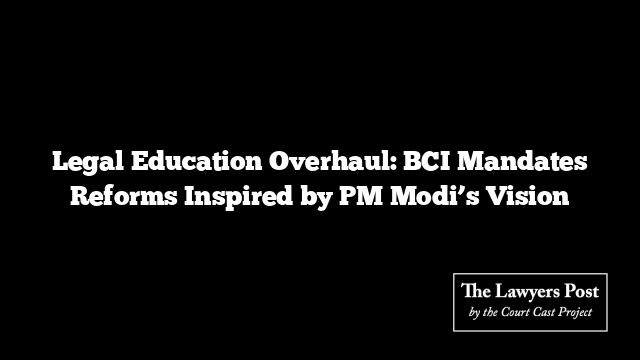The Bar Council of India (BCI) has issued a transformative circular calling for immediate implementation of several key reforms across all Centres for Legal Education (CLEs).
In a directive issued on May 20, the BCI emphasizes that these changes are inspired by various remarks made by Prime Minister Narendra Modi on the need for progressive legal education. His suggestions include introducing new subjects, mandatory mediation training, enhancing exchange programs, and increasing female representation in legal studies.
The circular underlines the necessity for these reforms, highlighting that while the National Education Policy (NEP 2020) sets broad guidelines for improving education, the BCI must specifically enhance the quality and scope of legal education in India. The Higher Education Commission of India, as envisaged by NEP 2020, will oversee most higher education except medical and legal fields, leaving the BCI responsible for legal education standards.
Key reforms outlined in the circular include:
- Emerging Technologies: Incorporating subjects like Blockchain, E-Discovery, Cybersecurity, Robotics, Artificial Intelligence, and Bio-Ethics into the curriculum.
- Constitutional Values: Emphasizing practical understanding of constitutional values such as social, economic, and political justice.
- Contextual Learning: Integrating socio-economic and cultural contexts to provide a nuanced understanding of law.
- Bilingual Education: Adopting both English and regional languages to make legal education more accessible.
- Interdisciplinary Approach: Encouraging critical thinking and research across disciplines to address legal challenges comprehensively.
- Mediation Training: Making mediation a compulsory subject.
- Tech Integration: Implementing computer education in legal studies.
- Updated Curriculum: Including the Bharatiya Nyaya Sanhita, 2023, Bharatiya Nagarik Suraksha Sanhita, 2023, and Bharatiya Sakshya Adhiniyam, 2023 in the syllabus from the 2024-2025 academic year.
- Regulating Online Courses: Prohibiting non-recognized online law courses and emphasizing the importance of classroom education.
- Degree Equivalence: Requiring foreign law degrees to be equated with Indian LL.B degrees through the BCI.
- Standardized Pathways: Enforcing the recognition of specific educational patterns for law degrees, rejecting unauthorized collaborations with foreign universities.
The BCI stresses the importance of these changes in keeping legal education relevant and effective, urging CLEs to adapt to the evolving nature of legal practice and global trends. Compliance will be closely monitored, with non-adherent institutions facing possible sanctions.
This initiative also includes measures to curb the proliferation of sub-standard law colleges, ensuring a higher standard of legal education across the country. The BCI’s comprehensive reforms aim to elevate the quality of legal education, aligning it with contemporary demands and global best practices.





